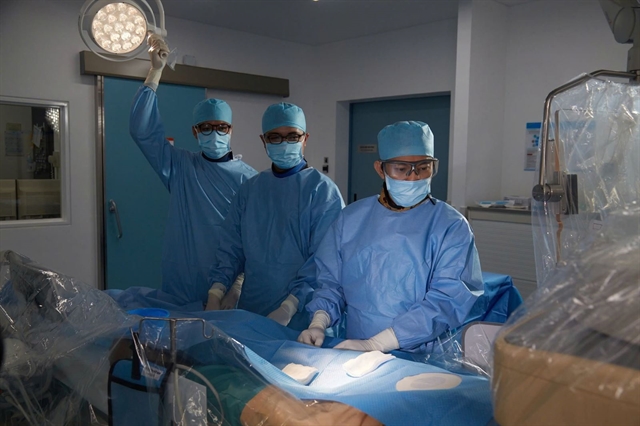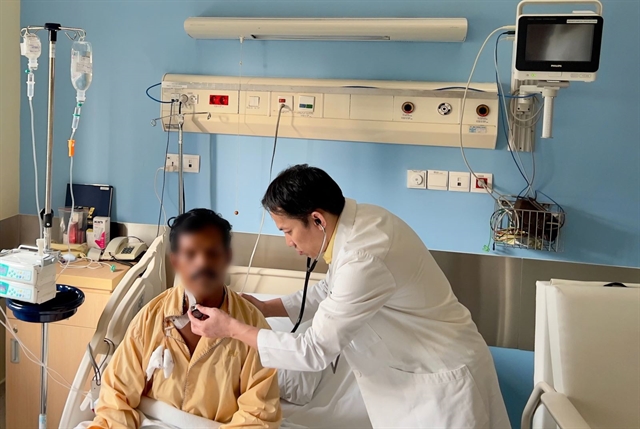 Society
Society

 |
| Dr Hồ Minh Tuấn performs the cardiac catheterisation procedure on the patient. — Photo courtesy of the hospital |
HCM CITY — While working on a ship off the coast of Bà Rịa - Vũng Tàu (HCM City), an Indian electrician suddenly suffered severe chest pain, difficulty breathing, and collapsed.
Onboard medical staff performed cardiopulmonary resuscitation, administered multiple defibrillations, and intubated him, but his condition remained critical.
He was urgently brought ashore for emergency treatment.
Doctors confirmed that he had suffered a heart attack and arranged his immediate transfer to FV Hospital, which is equipped with a Cathlab and advanced facilities for treating complex cardiac cases.
According to FV Hospital, the patient, P.A. (49), was admitted in critical condition with a heart attack complicated by cardiogenic shock and cardiac arrest.
Dr Hồ Minh Tuấn, head of the hospital’s Cardiology and Interventional Cardiology Department, explained that cardiogenic shock occurs when the heart loses its pumping ability, causing fluid to accumulate in the lungs and requiring intubation or high-flow oxygen therapy.
The medical team swiftly performed a percutaneous coronary intervention. With the support of advanced imaging systems, they quickly identified the blocked coronary artery and placed a stent, restoring blood flow to the heart immediately. The patient’s electrocardiogram and blood pressure gradually stabilised. The entire procedure took just over 20 minutes.
 |
| Dr Tuấn examines patient P.A. after the procedure. — Photo courtesy of the hospital |
Following the intervention, the patient was placed in intensive care. He was extubated the next day, and after 10 days of treatment, his heart function had nearly returned to normal. He was discharged and able to return to India on a commercial flight without medical assistance, Dr Tuấn said.
According to the World Health Organisation, cardiovascular diseases are the leading cause of death globally. An estimated 19.8 million people died from these diseases in 2022, representing approximately 32 per cent of all global deaths. Of these deaths, 85 per cent were linked to heart attacks and strokes.
Dr Tuấn emphasised that timing is critical in cardiac emergencies, determining survival, recovery, and risk of complications. The American Heart Association recommends a “golden window” of 90 minutes for performing percutaneous coronary intervention, measured from emergency admission to vessel reperfusion.
“At FV Hospital, we shortened the emergency response time for restoring blood flow to the heart to a maximum of 70 minutes. For patients transferred with prior notice, the procedure can be performed in just 25–30 minutes,” he said.
FV Hospital noted that the number of patients referred to its Cardiology Department from clinics and other hospitals had risen by about 15 per cent annually, with cases of heart failure and cardiogenic shock increasing by up to 30 per cent. The hospital maintains a 24/7 “Golden Hour” emergency heart attack team and its “70-minute golden protocol,” enabling patients to escape critical danger, recover faster, and minimise complications. — VNS




